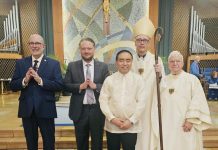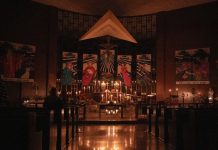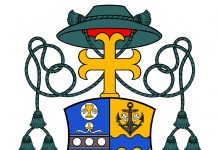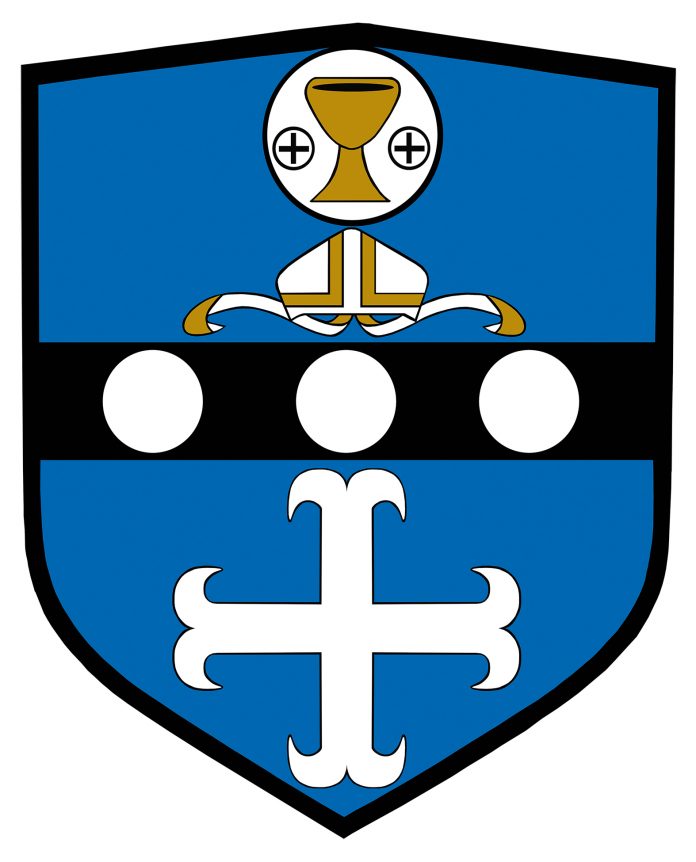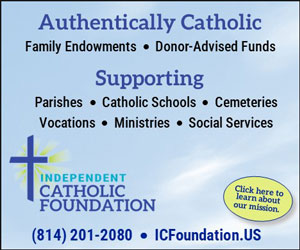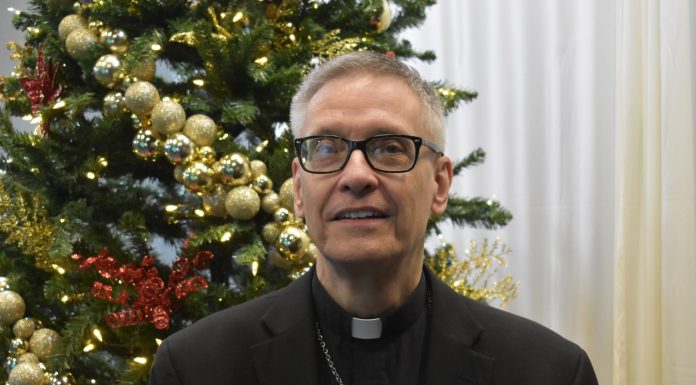As previously announced, beginning June 14, 2020, the Solemnity of the Most Holy Body and Blood of Christ (Corpus Christi Sunday), pastors and administrators are authorized to begin public celebration of Mass while continuing the Distribution of Holy Communion at the conclusion of Mass.
The number of persons permitted to attend Mass in a church or other approved indoor location is not determined by a set number recommended by public health personnel. It is determined by the number of persons who can be accommodated within that space according to the plan for safe physical distances in each church. We are using the standard of 6 feet between those not from the same household. Therefore, the calculation of this number of persons will take into account couples or families who reside together in the same dwelling and may sit together.
Ushers and ministers of hospitality do not need to be counted insofar as they normally do not take a seat in a fixed place, but remain at a distance at church entrances in order to carry out their function.
Pastors and administrators are authorized to celebrate the Sacraments of Initiation (Baptism, Confirmation, First Holy Communion) according to the following directives:
1. Because of the limited seating arrangements due to physical distancing within churches, these sacraments are to be celebrated at a Mass or Masses on a weekday (Monday-Friday) evening that is scheduled expressly for that reason. This will provide for a greater opportunity for at least sponsors and some family members to be present, while keeping Saturday and Sunday Masses available for parishioners.
[For example, if St. Alphonsus Parish has 25 children who are prepared to receive First Holy Communion, the group could be split into 5 groups so that parents and some other family members could be present. This would require 5 Masses for First Holy Communion.]
2. The reception of the Precious Blood from the chalice is not permitted at any Masses, including First Holy Communion.
3. Depending on local circumstances, and the needs and wishes of their parents, it would be appropriate to provide an opportunity for the Sacrament of Reconciliation on another day or days for the First Communicants and family members.
4. With regard to the Sacrament of Confirmation for young persons, Pastors /Administrators must submit to the Bishop’s office a list of all who will be receiving Confirmation, together with the explicit request for the faculty to confirm as required according to canon 884 §1. The letter should indicate how many liturgies will be celebrated in which Confirmation will be administered.
Page Two
5. Mass(es) with Confirmation should be celebrated on a weekday (Monday-Friday) evening. The number who are to receive the sacrament should be determined by the seating capacity of the church according the safe distance seating arrangement.
6. Precautions must be taken with regard to the role of the Confirmation Sponsor.
• First, those to be confirmed should arrive at their seat in the church and not participate in the entrance procession.
• Sponsors are not to place a hand on the shoulder or in any other way make physical contact with the one being confirmed.
7. The laying on of hands together with the prayer of the celebrant over the whole group is made according to the liturgical text (see attachment), followed by the anointing of each candidate with the words: “Be sealed with the Gift of the Holy Spirit. ”
8. At the anointing with Sacred Chrism, the celebrant will dip a cotton ball lightly into the Sacred Chrism and make the Sign of the Cross while saying the prayer (Be sealed with the gift of the Holy Spirit). The cotton ball is then discarded in a paper bag held by an attendant/server. The bag and contents are to be completely burned following the Confirmation Mass.
9. When the celebrant concludes the anointing with Sacred Chrism, the sign of peace may only be spoken. There is no handshake or other physical contact (e.g. hug/embrace).
10. The Bishop is available to celebrate the sacrament of Confirmation. This request is be made by contacting the Bishop’s office.
11. The precautions and rubrics outlined for conferral of these sacraments also apply to those participating in the process of Christian Initiation of Adults. These sacraments which are traditionally received at the Easter Vigil should be administered at a special Mass on a weekday.
12. More than one Mass may be needed for the sacraments of Christian Initiation of Adults due to the number of candidates or in order to better accommodate the needs of those being initiated, their sponsors, and families.
13. Baptisms of infants may take place during or immediately following Sunday Mass according to practice in most places. It may also be celebrated at a weekday Mass.
14. The same distancing requirements, proper use of a cotton ball for the anointing, and participation of Sponsors apply to Baptisms as outlined for the sacrament of Confirmation.
15. Rehearsals/preparations for the celebration of these sacraments are to include careful instructions for the candidates, sponsors, and others who may otherwise be inclined to interact with spontaneous physical contact.
16. Clarifications concerning these directives for the Sacraments of Initiation for Children and Adults should be directed to the Bishop or Vicar General.
18. Necessary precautions should be taken with regard to photographs which would normally group persons close to one another.
Page Three
Additional Directives Concerning The Place for Celebration of Mass
19. Pastors/Administrators are reminded that permission remains in effect for the celebration of Mass in a parish hall or activity center, especially if it provides for a larger seating capacity with due regard for the established safe distancing plan.
20. Any of the celebrations of the Sacraments ofinitiation for Adults or Youth may take place in a hall or parish center, but not in an outdoor setting.
21. Insofar as there may be room for a greater number of participants, it is permitted to celebrate Sunday Mass (including Saturday vigil Mass) in a suitable outdoor setting, even a public park, as long as other activities in that setting do not distract participants or otherwise might be incongruous or even disrespectful in relation to the Sacred Liturgy.
22. Arrangements must be made for a canopy in case of rain because Mass celebrated outdoors must be completed even by the celebrant alone. If it begins to rain and there is no church or indoor space nearby, the people should wait in their cars until the rain subsides. Holy Communion is then distributed at the conclusion of Mass.
23. Safe distancing must be observed at all times, including at the distribution of Holy Communion where people would be moving about.
24. There should be sufficient ordinary and extraordinary ministers for the distribution of Holy Communion. The reception of the Precious Blood from the Chalice by the people, including Extraordinary Ministers of Holy Communion is not permitted until further notice.
25. Given the unfamiliar surroundings in an outdoors setting or in a parish hall, there should be a sufficient number of ushers or attendants to guide and assist people in attendance.


